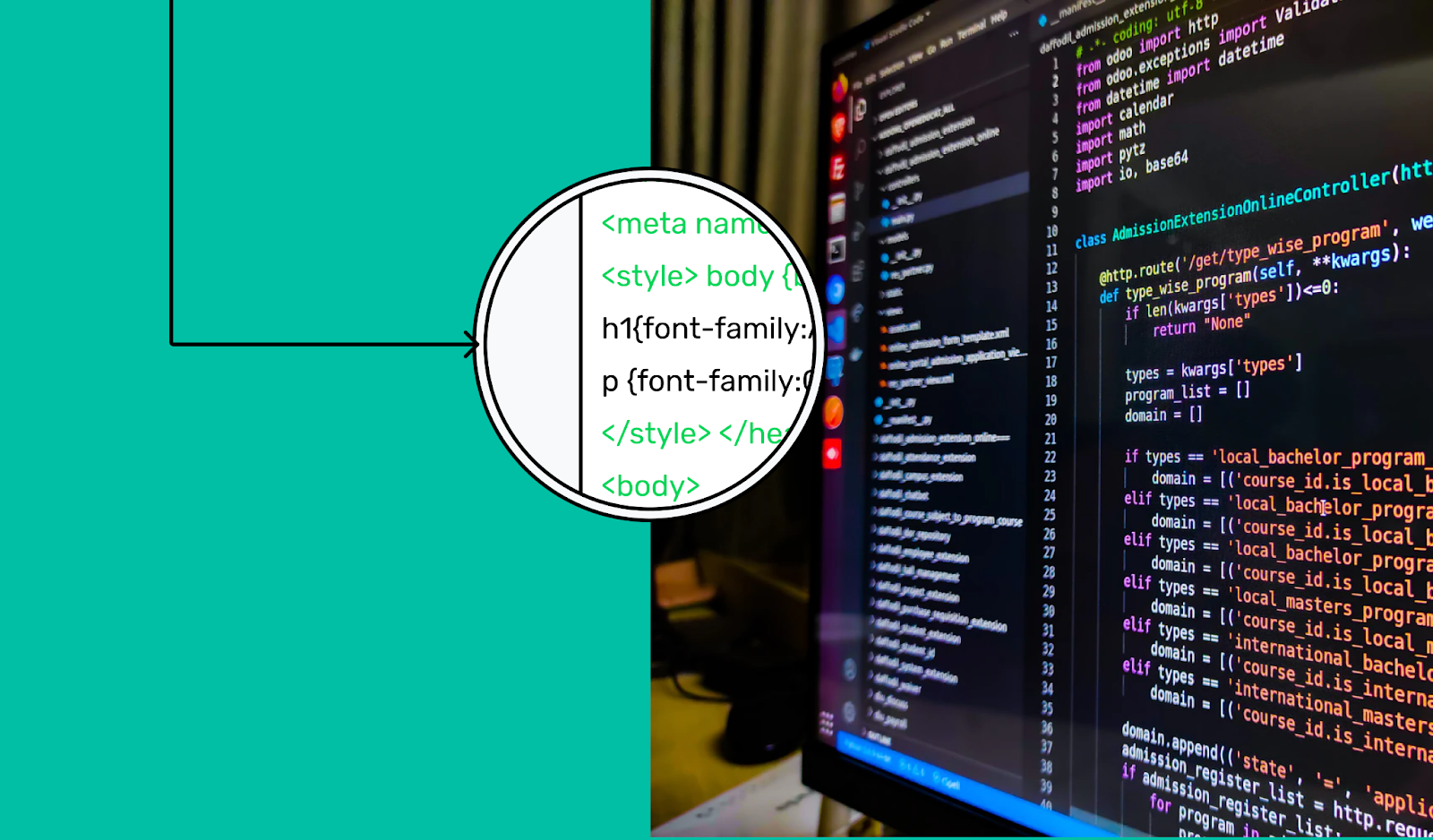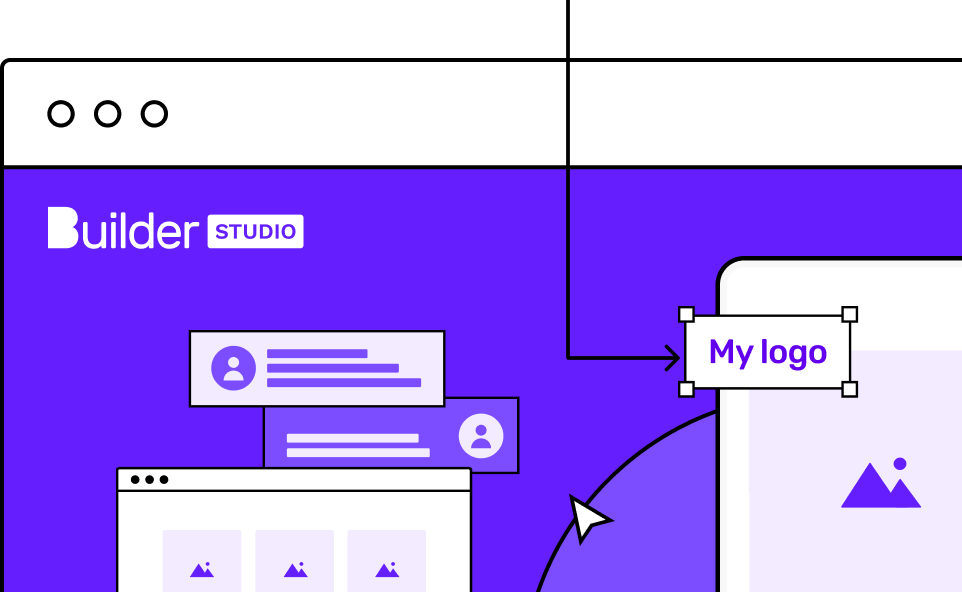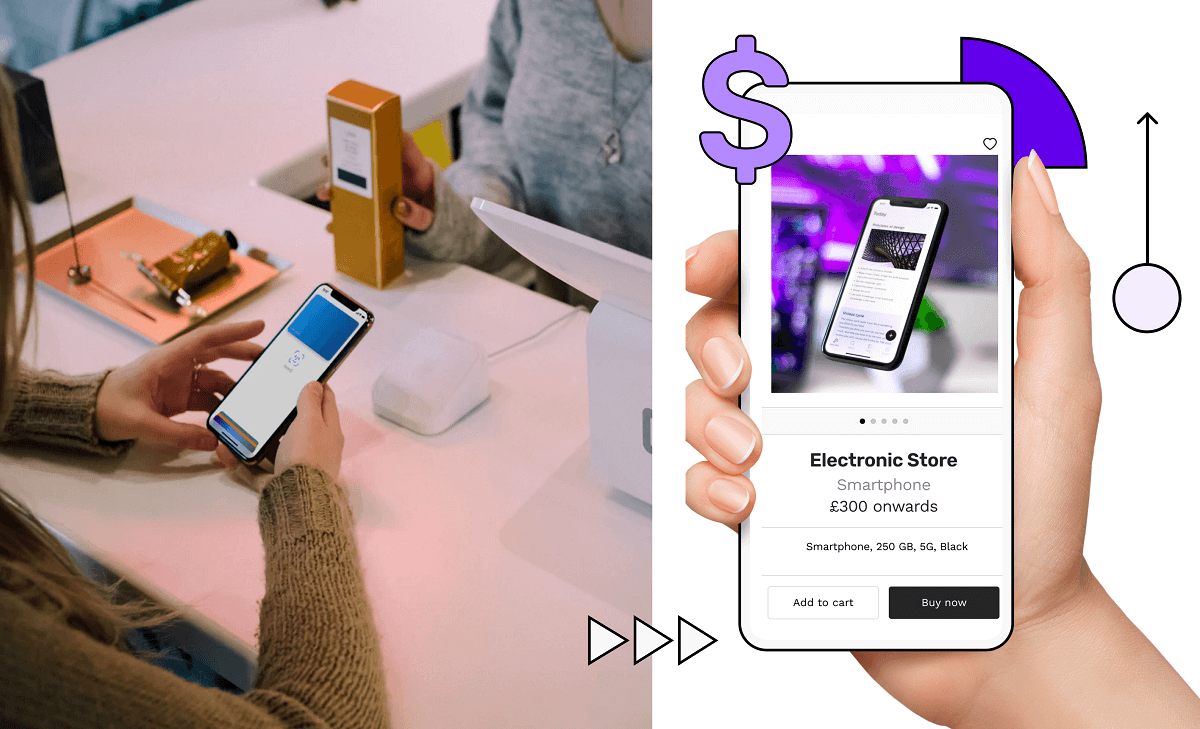
Want an app for your business and trying to find out how much it should cost? This is the guide for you. We’ll begin by introducing the different types of apps. Next up, an in-depth look at the app development process. How much should it cost? We’ll explore industry averages and some common pitfalls. By the end of the article, you’ll understand how complexity influences app price and how to get an accurate quote for your app.
Types of mobile app
The cost to build an app varies depending on how complex it is. Before going any further it’s worth creating some rough definitions based on the complexity. These definitions aren’t set in stone. They’re fuzzy and will vary depending on who you ask.
What is a trivial app?
This is as basic as it comes. It does one thing well – think about a flashlight, calculator or timer app. They will be able to use information supplied by a user, but it won’t be saved and the app doesn’t offer any benefits to the creator.
Apps of this complexity will often be the first project for aspiring programmers. They’re quick to build and won’t offer a competent developer any technical challenges. Experienced programmers can create apps of this complexity in a handful of hours.
What is a simple app?
This is the minimum for what most people would consider a ‘proper app’. The functionality varies but it often supports some personalisation via a user account. Simple apps will likely include the ability to create an account and a profile section. Some limited communication features may be included too.
Once the user has a profile your app can display information that’s personalised for them. This information isn’t found on the user’s device. It comes from your webserver. The fact that you can modify the data they see is a strong indicator you’ve progressed from a trivial app into a simple app. Additionally, you’ll often have access to a dashboard that gives you insights into what your users are doing.
What is an intermediate app?
Things are starting to become more complex. The majority of popular apps fall into this category. They can do everything a simple app does and add many useful features. A better user experience (UX) is common in intermediate apps as they give the user more ways to interact with your app:
- Social features – make it easy for users to share on social media
- Activity feeds – support nuanced customisation and search
- Ecommerce solutions – customers can pay for things within the app
- Device features – request permission to use the camera, contact list, location, etc...
The app creator will get access to much more user data. They’ll be able to utilise this to run targeted campaigns and add further personalisation to their users’ experience. For most businesses, an intermediate app will meet their needs. If you’re looking for an app for your business, take a look at our Studio Store apps. They come with all the features your business needs at an affordable price.
What is an advanced app?
These are cutting edge apps. They’re constantly updated to make use of the newest technological developments. Some of them build custom technology to deliver novel user experiences.
An app like uber is a good example of an advanced app. It uses location data and some fancy algorithms to optimally pair drivers and passengers. It also includes extra security features such as ‘verify your trips’ which means passengers need to share a code with the driver before their trip starts. Innovations like these are what makes Uber an advanced app.
Advanced apps also benefit the creator more. They’ll often collect even more data and make use of AI to draw novel insights. Furthermore, the user journey will be largely automated with nurturing marketing communications. For most businesses, an advanced app is not required. It’s only required if you have a very unique business idea that needs a bespoke solution. If that sounds like you, then pop over to Builder Studio and see how we can help.
App Development process
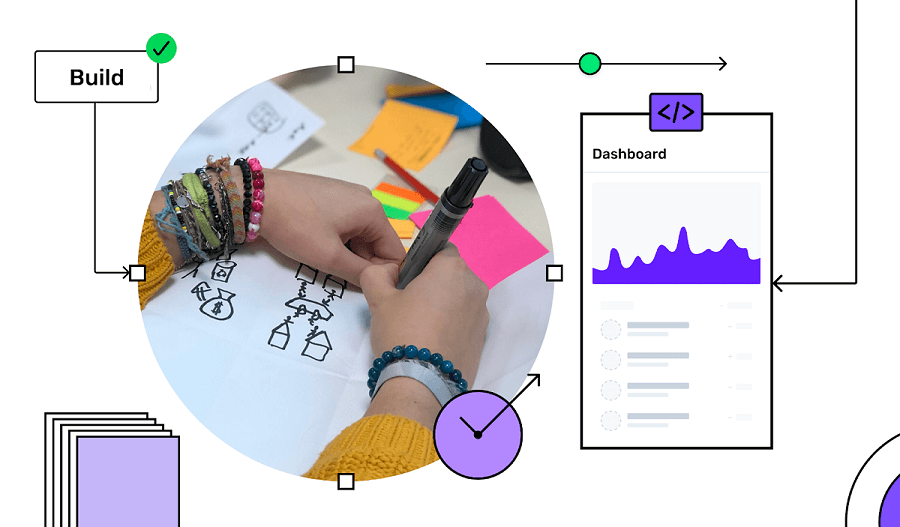
You now understand the different levels of app complexity. Let’s think about how this affects the app development process.
What’s your idea?
The very first step is deciding what your app should do. You need to have a good understanding of your business model before working through this. Our guides on dropshipping and starting an online business are a good place to start.
There are 3 things you need to think about:
- Function – what’s the exact thing you want your app to do? List every feature you want your app to have. Especially the ones you think are obvious!
- Platforms – do you want a Web, iOS or Android app? Maybe all 3? You also need to decide if you want hybrid or native apps? We explain these terms in our ‘Convert your website into an app’ guide.
- Device features – will your app use the camera, fingerprint scanner or NFC chip? Some of these features are easy to use with APIs, but depending on your use case they can add a lot of complexity.
Design
Once you have the outline of your idea, it’s time to design your app. We’ve written a comprehensive guide that covers how to design an app. In short, you need to create a mockup that shows how the user interacts with your app. Ensure you follow best practices in UX design – make it simple and intuitive. After you have a working model you might want to hire a user interface (UI) designer to create the graphic assets. They’ll turn your idea into something beautiful.
Build
Once your design is ready it’s time to build your app. The options depend on your risk tolerance and budget. They can be roughly split into 3 categories:
1. DIY app creation
If you’re comfortable with Android Studio or Xcode IDE then you can make your own apps. This option is the cheapest as the only fees you pay is for listing your app in the Play Store or App Store. Of course, it will also take a long time.
You have to consider the opportunity cost. How much more money could you make by letting someone else build it for you while you focus on your business? If you're still interested in doing it yourself, check our guide on app programming languages.
2. Hire a freelancer
Sites like Upwork and Fivver make it easy to find freelancers with the skillset you’re looking for. These marketplaces allow previous customers to rate the freelancer, which means you have an idea of their skill level.
There are a few concerns with this approach. First, there are a lot of bad freelancers. You’ll need to sift through lots of rubbish to find competent individuals. Second, these individuals will often have lots of clients that they’re juggling. This means they’re less invested in your final product. Experienced programmers who can make your app probably don’t have the design skills to make it beautiful. This means you accept a less polished UI or hire a designer too.
If you’re lucky you’ll find a skilled, hard-working freelancer who wants to see your idea succeed. More likely, you’ll get a quickly completed, mediocre app. Oh, and if your app has any tricky bugs down the line, there’s a good chance they won’t want to invest the time required to fix it – if they do, expect a hefty bill.
3. Work with an app development company
Established app developed companies offer the safest option. They have years of experience and have likely worked on large long-term projects.
One huge benefit is that most companies will assign you a project manager. They’ll take personal responsibility for ensuring your app is exactly how you envision it. The project manager will have an app development team and UI designers working under them. This means you get an app that’s both beautiful and functional.
Although app development companies offer several advantages, they generally cost more. Also, there are potential risks you need to be aware of: unclear pricing and delivery dates.
Unclear pricing can appear in a few ways. The most common is when a company gives you a quote and then surprises you a few months in with another invoice. They’ll claim that the feature was harder to implement than they anticipated or that your requirements weren’t communicated clearly.
Unclear delivery dates occur when companies don’t know how long the software creation process will take – they might quote you 3 months, but end up dragging it out for several months more. If you’re paying by the hour this is a commonly used tactic to squeeze more money out of you.
We’re different. We use an AI-powered approach that calculates exactly how much work your app will require. This lets us provide accurate pricing and delivery times. Unlike our competitors, the price we say is the price you pay! If you’d like a no-obligation quote, check out Builder Studio.
What’s the average cost of Android app development?
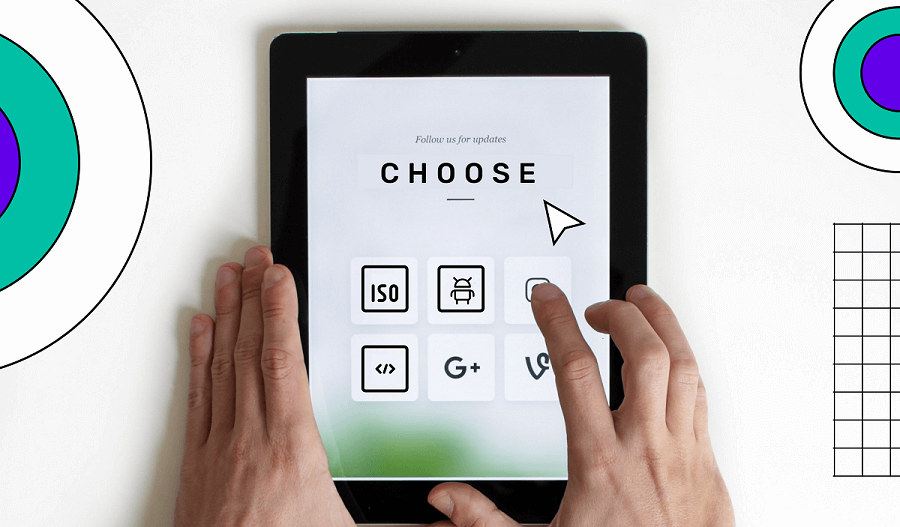
We mentioned the importance of choosing the platform you want your app available on. As iOS and Android use a different language the cost varies between them. For an advanced app like Uber, freeCodeCamp estimates it would take approximately 5000 hours to build.
They claim that beginner Android developers make somewhere about $20 per hour. While the most experienced charge around $150 per hour. It’s safe to assume Uber was only hiring above average developers. Let’s see how that total cost works out for different price points:
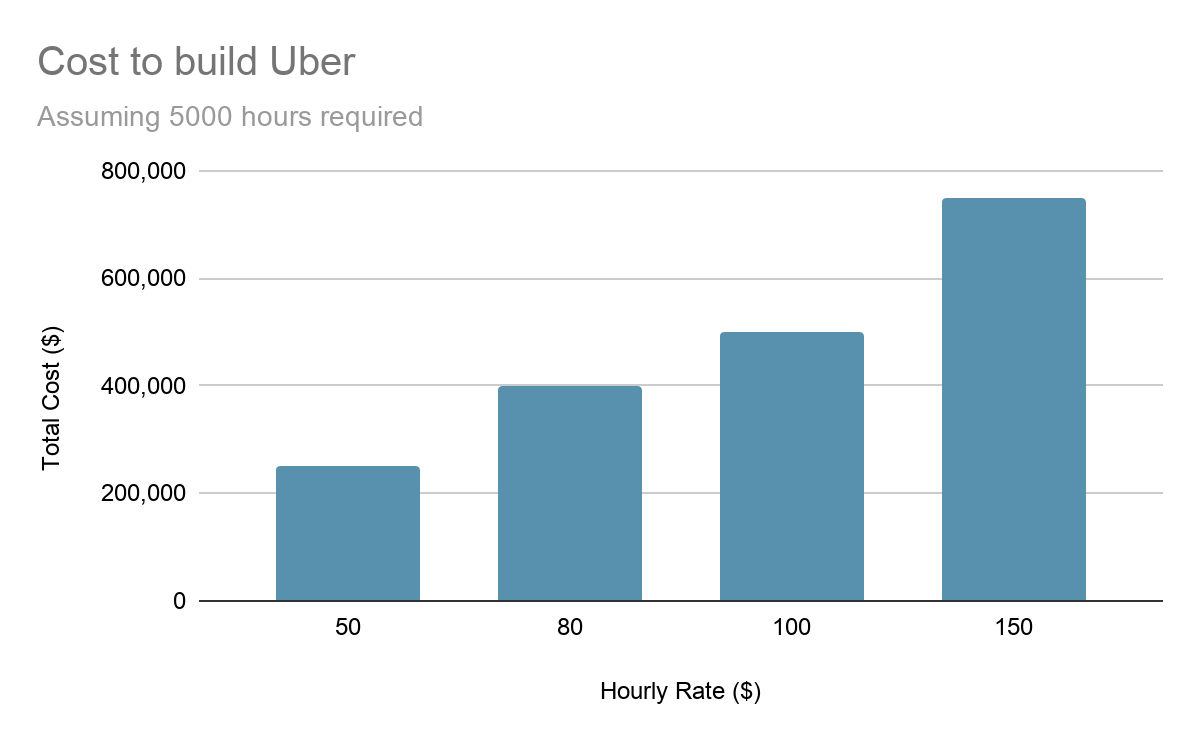
This is obviously not the average cost. Uber is an advanced app that uses several bespoke features. It illustrates how expensive app development can become. This is part of the reason it’s so important to plan your app out in advance. You don’t want to keep adding features and end up with an unexpected 0 added to your bill!
Intermediate apps won’t take as long to make. Somewhere between 3–6 months is the average across other developers. Let’s assume an 8-hour day. That’s approximately 730 hours at the low end and 1460 hours at the top.
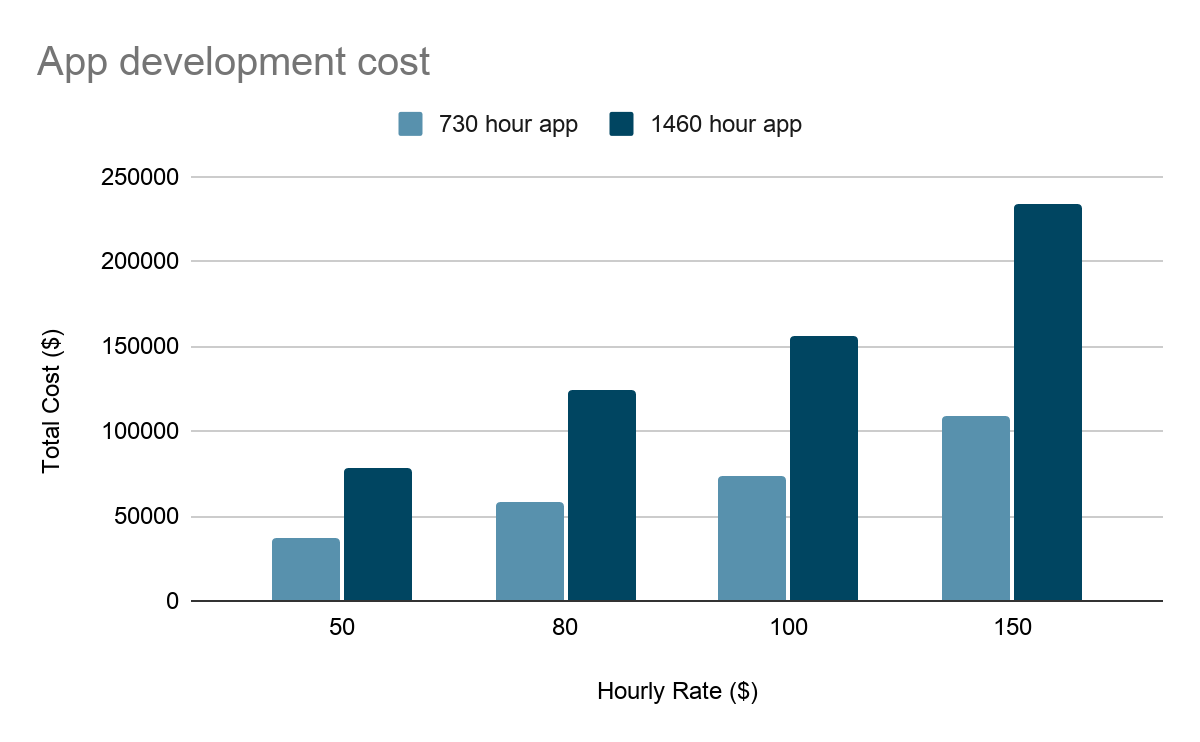
It’s hard to estimate the cost of custom mobile apps as there are so many variables that affect the price. Hopefully this gives you an idea of how much a bespoke app can cost.
If it seems wildly expensive, don’t panic! Here at Builder.ai, our AI-powered approach allows us to build your app 6x faster and 70% cheaper – more on this later.
What’s the average cost of iOS app development?
We said the cost varies between iOS and Android development. And it’s technically true. Lots of app development companies are going to have more experience creating mobile applications for either iOS or Android. This means they’ll be slower and charge more when using the language they aren’t as familiar with.
However, if you work with developers that are equally skilled in both the cost will be very similar. The salaries of Android and iOS developers are almost the same: entry-level, median and most experienced. This means you can use the Android prices as a guide for iOS too!
How much does custom app development cost?
The big question isn’t Android or iOS. It’s not even just the app features that influence the cost. There are loads of factors that affect the price:
- Design costs – bad design will destroy an otherwise good app. The ‘blink test’ suggests a user will decide to stay or go in 3–5 seconds.
- Back end – we discussed how most apps will store data on a server. How much is this going to cost? You don’t want to blow your budget on a fancy app and not have enough to host it. Just so you know, our Studio Store apps include hosting for the first 2-years.
- Security – the security requirements of an app will influence its price. Most developers can create a login screen. But does it protect user data and resist exploits? Our team keeps your app up to date so everyone stays safe.
- Copywriting – the description in the app store and the text within your app are important. You’ll need to hire a copywriter to ensure that it’s clear and engaging. Don’t forget to budget for this!
- Legal fees – depending on the user data you’re collecting you might need to pay for various legal documents, such as a data usage policy.
How to find an app developer?
It goes without saying, we’d recommend working with us.
If you want to have a look at the competition first, there are a few things to keep in mind. The first thing is to look at their website. Does it look good? If they can’t present themselves professionally why would you trust them to represent you?
Next, consider how you found them. There’s no right or wrong answer, but a recommendation from a friend is probably going to be worth more than an unsolicited LinkedIn message.
Where are they based? The location will affect overall costs. The average developer salary in the US is significantly higher than in most parts of the world. Although that doesn’t mean they’re better. Video chat means you can work with developers from around the world and find a team that you trust. You want someone who understands your ideas and can convey your business's personality.
How we approach software development
Here at Builder.ai, we understand that every business is unique. Embracing that individuality is baked into our approach to building apps. But there are a lot of similarities between businesses too...
We have 2 approaches that we want to tell you about:
- Studio Store apps: these are pre-packaged apps that come with everything your business needs to grow. We’ve built them for a variety of businesses. We handle all the technical details. All you have to do is add your personal touch.
- Builder Studio: this is where we make bespoke apps. Around 500 features make up 80% of all software – things like login, secure payments and Live Chat. We coded these features as reusable Lego-like blocks.
When you’re building your app, our AI will suggest features that could improve your idea. Then our network of specialists customise your software, so it fits your idea and brand perfectly.
It’s because we use these Lego-like blocks that we can be so accurate with our pricing and delivery times. We also offer aftercare, so your software never goes out of date and cloud capacity from all the big providers – our customers saved over $4.5m, last year.
Final thoughts
You now understand all the variables that affect the pricing of an app. You know the pros and cons of DIY, freelancers, and app development companies. You’re ready to make an informed decision. What’s best for your business?
Check out Studio Store for our pre-packaged apps.
Need something more complex? Get a no-obligation quote for your bespoke app at Builder Studio.
FAQ
1. How much does it cost to build your own app?
There’s the opportunity cost – how much could you grow your business in the time it’ll take you to program an app on your own. From a financial perspective, it’s almost free. There’s a nominal charge for listing your app on the Play Store ($25) and App Store ($99).
2. How much does it cost to hire an app development company?
The exact figure is going to depend on what you want your app to do. More features will require more time to get everything working perfectly.
At Builder Studio we use an AI-powered approach that means your costs and timeline are worked out instantly by AI before you start. You choose the features you want, share any design ideas and our team of designers and app developers handle the rest.
3. Does my business need an app?
Most businesses would benefit from an app, but it’s certainly not needed by everyone. Have a look at our ‘mobile apps for small business’ guide and see if an app is the right choice for your business.
4. I just want an app for my business. Is there a simple option?
If you want an easy-to-use mobile app designed by a team of professionals, consider our Studio Store apps. They’re prepackaged and deliver all the features you need to grow your business. You don’t need any technical skills to get set up – we provide hosting and help set you up in the app markets.
5. What’s next after I’ve got my app?
Having an app for your business is great. It offers loads of benefits. But it doesn’t magically boost your business. The first thing to do once you get an app is drive your customers towards it. This can be through promotions or social media campaigns.
Once customers are using your app it’s time to start marketing. Push notifications are the secret weapon of app marketing. To find out all the juicy details, read our guide: ‘Growing your business with push notifications’.




